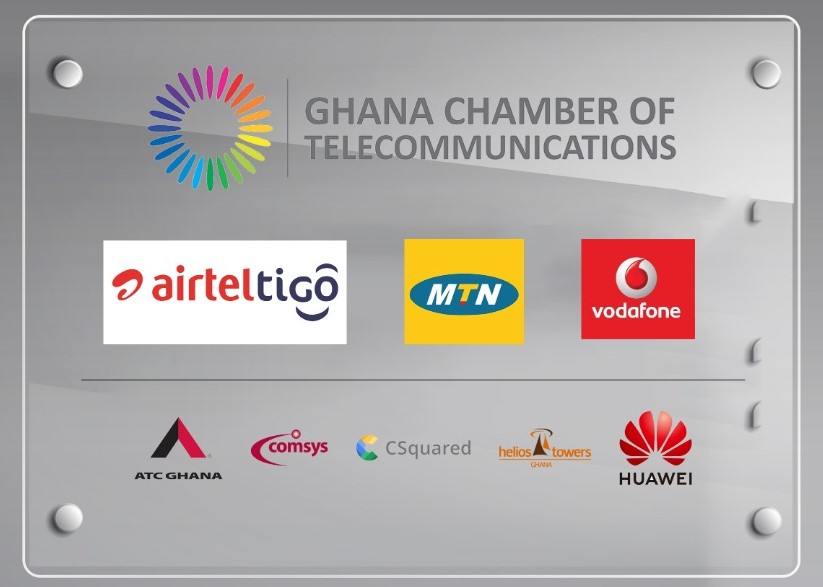FOR IMMEDIATE RELEASE
Accra, November 24, 2020 – The Ghana Chamber of Telecommunications has released a study indicating total tax contributions enabled by the mobile industry to support the socio-economic development of the country.
The study carried out by the mobile industry association indicates mobile network operators and infrastructure companies contributed a total of GH¢3.2 billion in taxes and other remittances to the government in the year 2019.
This figure represents approx. 9.5% of Ghana’s annual total revenue basket.
Key highlights from the study shows Communication Service Tax (CST) was GH¢414m, Value Added Tax (VAT), GH¢480m; Corporate Income Tax (CIT), GH¢832m; Withholding Tax (WHT), GH¢415 million, Import Duties, GH¢210 million and National Fiscal Stabilization Levy (NFSL) was GH¢71m.
The Surcharge on International Incoming Traffic (SIIT) was GH¢107 million in 2019; SIIT is the quantum of six cents per every minute of call that comes from overseas into the country. Mobile Network Operators pay that to the National Communications Authority (NCA), the industry Regulator.
There is also the pay-as-you-earn (PAYE) tax, which stood at GH¢96 million and finally the National Fiscal Stabilisation Levy (NFSL), which is GH¢71 million. NFSL was introduced in 2013 to stabilise the economy over a period of 18 months, ending December 2015. This tax has continuously been renewed.
The study also shows the mobile industry widely provides 6,700 direct jobs and over 1.8 million indirect jobs, contributing 2.93% to (Non-oil) GDP, and invested GH¢1.55 billion in capital expenditure within the fiscal year 2019.
The telecoms Chamber noted that, in spite of the heavy tax burden, the telecoms industry continues to commit investible funds into capital expenditure to meet customer service quality and experience needs. “CAPEX investment has increased exponentially in the fiscal year, however there is the need for policy to support and enable even more investment by all players into the ecosystem to meet customer demand for mobile services” said Dr. Ing. Kenneth Ashigbey, CEO of the Chamber.
The mobile industry believes that policy enablers such as tax reforms, tax rebates in relation to import of infrastructure and equipment’s could improve the affordability of mobile technology and services for customers yielding greater strides for all stakeholders in the long-term.
Data from the study showed, the industry wields over 41 million active voice SIMs, 28 million active data subscribers, 14.5 million active mobile money customers and over 300k active merchants/agents.
The study further noted that, “appropriate spectrum management framework [by the industry regulator] will provide needed clarity for more funding into existing and new technologies such as 4G and 5G, which requires further policy direction and support to grow.”
Dr. Kenneth Ashigbey, finally concluded that, Mobile is the most cost-effective way of extending access to ICT, the internet in Ghana as well as driving the digitization agenda we pursue. It is therefore fundamental to helping our government achieve its objectives of expanding the ICT infrastructure, meeting last mile goals, connecting the unconnected and positioning our economy as a smart and digital ready market towards further growth.
End
Media Contacts:
For the Chamber:
Derek B. Laryea
This email address is being protected from spambots. You need JavaScript enabled to view it.
Editor’s Note
About the Telecoms Chamber
The Ghana Chamber of Telecommunication is the foremost mobile and technology industry association and a private initiative by the mobile network operators in Ghana. We are an advocacy institution established to help direct telecommunications policy, legislation and regulation, and pursue research towards the development of telecommunications.
As the voice of the mobile operators and tower companies in Ghana, we work through direct engagements with government (institutions), civil society, key stakeholders and consumers to shape the mobile ecosystem and maximize the socio -economic benefits of mobile in Ghana. The Chamber was registered in 2010 and inaugurated in 2011.


